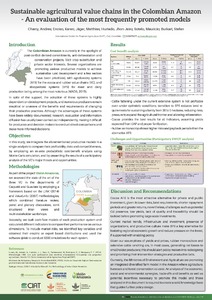Sustainable agricultural value chains in the Colombian Amazon - An evaluation of the most frequently promoted models
The Colombian Amazon is currently in the spotlight of post-conflict derived commitments, anti-deforestation and conservation projects, illicit crop substitution and private sector interests. Several organizations are promoting various productive models to achieve sustainable rural development and a few sectors have been prioritized, with agroforestry systems (AFS) for the cocoa and rubber value chains (VC), and silvopastoral systems (SPS) for meat and dairy production being among the most notorious (MADS, 2015).
In spite of the support, the adoption of these systems is highly dependent on development projects, and numerous producers remain skeptical or unaware of the benefits and requirements of changing their productive practices. Although the advantages of these systems have been widely documented; research, evaluation and information diffusion has usually been carried out independently, making it difficult for producers and decision makers to conduct direct comparisons and make more informed decisions.

